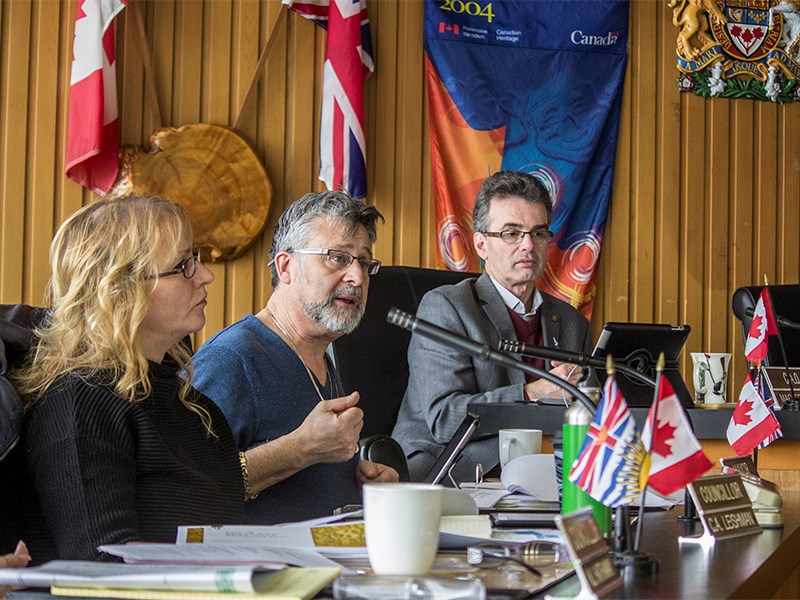City chief financial officer Kathleen Day presented to the finance committee on Thursday, March 23, about work underway to develop the city’s 2017 budget and five-year financial plan, which will be approved on May 4.
After reducing the number of potential capital projects and finding revenue that had not been reported during last month’s committee meeting, staff was looking to generate approximately $150,000 in service-level reductions to balance the budget.
After the meeting, Day said the process to develop this year’s budget has been long and, at times, difficult for council.
“With the tough decisions on reductions, this has been a bit of a continuous saga,” said Day. “It’s not been easy and now we’re coming down to the really hard ones.”
According to Day’s presentation, staff is recommending the shortfall be found through reductions in bylaw enforcement ($45,000), reducing the operating hours of Powell River Recreation Complex ($46,000) and cutting back on evening transit runs ($22,000) and pavement-management contracts ($35,000).
In prior meetings, the committee had indicated to staff that it would like to see the total tax increase limited to 1.9 per cent, which includes a 0.4 per cent increase for utility user fees.
Councillor Russell Brewer, chair of the finance committee, said the committee would be taking the next two weeks to consider staff recommendations for potential service-level reductions to make up the budget shortfall, as well as looking at other areas for potential savings.
“We’re not far from getting to 1.9 per cent,” said Brewer. “We're not talking about big-cost items, but the ones staff is recommending are significant. I don’t want to cut transit; we just had a conversation about making it easier for kids and others to get around.”
Councillor CaroleAnn Leishman said during the meeting that she could not support reductions to the complex at this point, as she had received feedback from the public saying a greater tax increase was preferred over a service reduction at the recreation centre.
Brewer responded by saying this was the reason why it was necessary to have the discussion on regional-recreation support for the facility.
Of the city’s approximate $25.5 million annual operating budget, close to $14 million is allocated for wages and benefits. Going into the 2017 budget, the city saw a $1.09 million increase in wages and benefits. The RCMP contract went up $111,000, with an additional commitment of $216,000 for back pay; $600,000 was allocated to the city’s Canadian Union of Public Employees (CUPE) workers for a two per cent pay increase and its job evaluation equalization program; increases in the International Association of Fire Fighters contract amounted to $110,00; and management contracts accounted for another $55,000.
City chief administrative officer Mac Fraser also made a brief presentation to the committee, telling its members it was staff’s opinion that the proposed cuts were the ones that would be the least severe.
Fraser said that deeper cuts could look at further reducing operations at the recreation complex, as well as cutting two firefighters and one RCMP officer approved by council in 2016. Council approved those positions as an overall cost-savings measures to reduce the amount of overtime being paid to current fire and police positions.
CUPE Local 798 president Graham Tonks said he would have liked for the union to have more input into the budget’s development.
“We haven’t been engaged in this budget process as of yet,” said Tonks. “We were in the past and I think we should be.”
Tonks said, as frontline workers, the city’s unionized staff has lots of experience and ideas on how to find efficiencies that could maintain service levels.
“We’re all residents of Powell River and we want to see the community thrive,” said Tonks. “CUPE is committed to doing what is necessary to help the sustainability of the city.”



